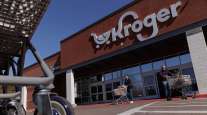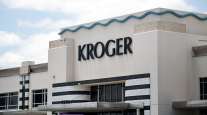The Denver Post
Kroger, Albertsons CEOs Give Details on Proposed Merger
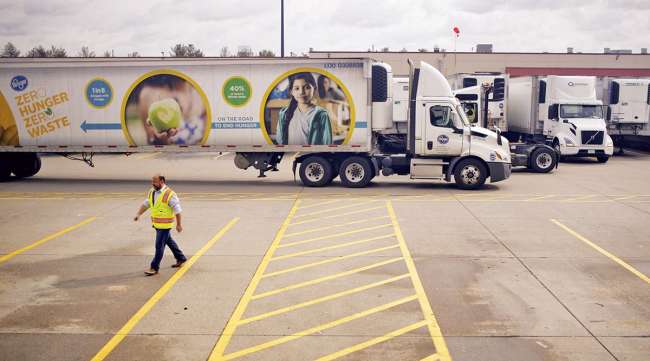
[Stay on top of transportation news: Get TTNews in your inbox.]
Kroger CEO Rodney McMullen and Albertsons CEO Vivek Sankaran pledged to lower prices, pay employees’ retirement pension funds, respect their union contracts and not to lay off frontline associates if their proposed grocery merger prevails.
Nine months after the announcement of the almost $25 billion deal, the executives sat down for the first time with a newspaper on July 21 to provide updates on the merger process.
If the deal is successful, the combination of the two grocery companies would also unite two major private trucking fleets. Kroger and Albertsons rank Nos. 38 and 40, respectively, on the Transport Topics Top 100 list of the largest private motor carriers in North America.
But the pair face a tough road ahead with Kroger’s acquisition of Albertsons — a move first made public in October. The deal has attracted the ire of unions and farmers fearful of the possible consequences, including job losses, the proliferation of food deserts and jumps in prices.
The merger has also earned the skepticism of government officials. The two CEOs testified before the U.S. Senate in November, facing tough questions from lawmakers on both sides of the aisle.
See the 2023 Top 100 rankings
►Introducing the Top 100 Private Carriers
►Top 100 Private interactive map
►Private Fleets Continue Optimization Efforts
►Sector Rankings Illustrate Market Shifts
►Ashley's Trucking Fleet Keeps Furniture Moving
►Kroger, Albertsons CEOs Detail Proposed Merger
Sector Rankings
Food Service | Grocery
Beverage
Petroleum/Chemical
Industrial Gases | Agriculture/Food Processing
Wholesale/Retail | Manufacturing
Equipment Rental | Building Materials
Waste Management
Paper/Office Products
Construction
Health Care
Uniform Rental
Media & Entertainment
The leaders remain steadfast in their commitment to seeing it through.
“We’re where we thought we would be at this time in this process,” McMullen told The Denver Post.
They predict that the deal will close in early 2024, but neither would specify further on timing.
The CEOs argue the merger would better position them to compete against rivals Walmart, Costco and Amazon — all of which didn’t immediately respond to a request for comment.
Their industry’s competitive landscape has changed in recent years. A decade ago, 90% of Kroger’s conversations around business strategy focused on Walmart, McMullen said. This year, Walmart is discussed, but they also consider Amazon, dollar discount stores, restaurants and German chains Lidl and Aldi.
The leaders aren’t letting the country’s uncertain economic forecast for 2023 hinder their merger plans either. McMullen referred to it as a “short-term” condition, citing “faith in the U.S. that it’s going to be better in five or 10 years.”
With this deal, McMullen and Sankaran committed to creating jobs and lowering prices.
“No frontline associate will lose their job,” McMullen said. To consumers, he adds, “In my whole life, I’ve never ever thought about how to raise a price.”
They’ll put $1 billion toward associate raises and benefits over a period of five years, he said. And when it comes to either Kroger or Albertsons paying out employees’ retirement pension funds, that responsibility — and the duty of addressing underfunded pensions — will fall to the company responsible for that particular store, McMullen added.
Responses by Attorneys General
The proposed merger caused an immediate stink in Colorado. In December, Attorney General Phil Weiser declared that his office would lead a multistate investigation into the deal. He provided an update in a Denver Post opinion column in March after surveying the opinions of different Colorado communities, saying residents remain “worried about whether their local grocery store will stay open, whether their jobs are at risk, whether food prices will rise, and more.”
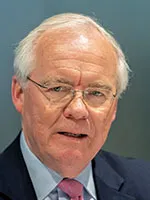
McMullen
As of July 20, he’s held nine listening sessions across the state, with plans for more in the future.
“The Department of Law continues its review of the proposed Kroger/Albertsons merger to ensure it is lawful, does not undermine competition, and is fair to shoppers, workers, farmers and suppliers,” the Colorado Attorney General’s Office wrote in an email. “It’s clear that Coloradans have concerns about the proposed merger’s impacts.”
The Federal Trade Commission and the Department of Justice are in the process of amending the guidelines that dictate how they review mergers and acquisitions to determine if they’re complying with antitrust laws. The agencies released a draft update to those guidelines, and urged the public to weigh in.
Out of the 13 proposed rules for mergers, No. 1 includes not significantly boosting concentration in highly concentrated markets, and No. 13 prohibits the creation of monopolies.
“We are issuing draft guidelines that are faithful to the law, which prevent mergers that threaten competition or tend to create monopolies,” Assistant Attorney General Jonathan Kanter of the antitrust division said in a statement. “As markets and commercial realities change, it is vital that we adapt our law enforcement tools to keep pace so that we can protect competition in a manner that reflects the intricacies of our modern economy. … Simply put, competition today looks different than it did 50 — or even 15 — years ago.”
Neither of the CEOs had studied the draft update yet, but they’re both ready to move forward with litigation if regulators reject the deal.
“There isn’t anywhere there’s monopoly concerns,” McMullen said.
Corporate Footprints
Albertsons Cos., based in Boise, Idaho, is made up of almost 2,300 retail stores and 290,000 employees across 34 states and Washington, D.C., according to its company profile. In fiscal 2022, it reported $77.6 billion in sales.
Not only are Albertsons and Safeway part of the company, but so are Vons, Tom Thumb, Haggen and other banner names.
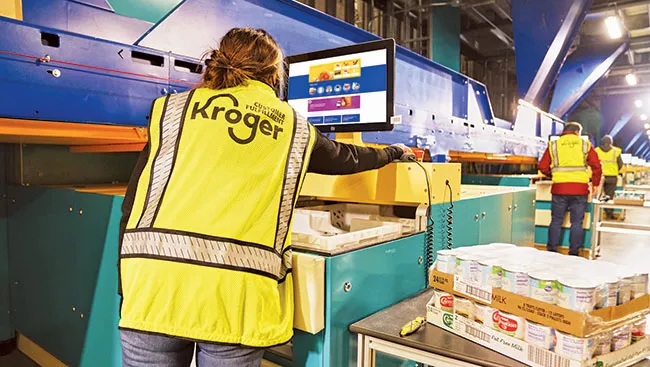
A Kroger Co. distribution center employee. (Kroger Co.)
Kroger’s footprint in the grocery industry is even larger. The company reported $148.3 billion in sales for fiscal 2022, its website reports. Its financial results for the first quarter of 2023 included $45.2 billion for total company sales — up from $44.6 billion for the same time last year.
Calling itself “one of the world’s largest food retailers,” Kroger runs about 2,700 supermarkets and multi-department stores, with almost 415,000 associates.
Headquartered in Cincinnati, the company’s banner names include Kroger, King Soopers, City Market, Fry’s, Harris Teeter, Fred Meyer and more.
“The combination of two of the largest stand-alone grocers in the industry will create a giant that is second only to Walmart,” market researcher Chain Store Guide reports.
Albertsons’ reach spans throughout much of the western U.S. and Northeast. Kroger’s territory also includes the West and the Southeast.
Opposition
The United Food & Commercial Workers Local 7 union, which represents Albertsons, City Market, King Soopers and Safeway grocery workers in Colorado, has vehemently pushed back against the merger.
“Mergers are not always for the good of the people,” President Kim Cordova said. “It’s for the good of shareholders and corporate executives.”
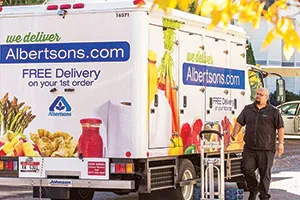
An Albertsons Cos. driver making a delivery. (Albertsons Cos.)
The union is worried about job losses, as dozens of Albertsons and Kroger stores overlap in Colorado, she said. In spite of McMullen’s promise not to shutter stores or lay off frontline associates, “we still believe that there’s going to be multiple store closures here,” she added.
The merger announcement purported that Albertsons could potentially form a subsidiary called SpinCo, a stand-alone public company that its shareholders would pick up once the merger closes.
“It’s one option,” McMullen said, calling it “a viable alternative.”
“We’re in the middle of talking to several different people in terms of interest in buying the stores that will be divested,” he said. “The stores that we divest, we will sell them to strong, viable competitors that are committed to supporting the union.”
They’ll divest stores in areas where there’s an overlap between Kroger and Albertsons locations, but “most people will assume the overlap is a lot more than it is,” McMullen said.
Both he and Sankaran said it’s too early to tell whether the divested stores will belong to Kroger, Albertsons or both, and plan to work with the FTC on it.
If they proceed with SpinCo, the companies anticipated that 100 to 375 stores would make up the subsidiary, according to their announcement. The broader divesture “could be anything between that or above that,” Sankaran said.
Cordova pointed to multiple reports that the number of potential stores to be divested is “now somewhere up over 700.”
SpinCo is “just their way, in our opinion, to dump the stores that they want to get rid of,” she said. “Divestitures just aren’t the answer.”
She fears that the merger could result in more job automation, which may also contribute to job loss.
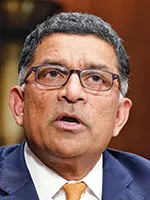
Sankaran
The deal could also impact the union’s “ability to bargain because we’ll have one unionized employer in the state” in the grocery industry, Cordova added.
Her union is part of the Stop the Merger Coalition, which more than 100 state and national organizations formed in March to oppose the deal. The coalition urges the public to push the FTC to halt the merger, arguing that it reduces competition, limits the market for farmers and more.
Christopher Jones, senior vice president of government relations and counsel at the National Grocers Association, predicted a merger between these two industry giants would create “immense economic power over food product suppliers, enabling them to squeeze brands for more favorable pricing, promotions and exclusive deals to the detriment of their smaller rivals and consumers.”
If the deal between Albertsons and Kroger is approved, “antitrust enforcers must put constraints on the ability of the combined firm to abuse its market power, while forcing divestitures of competing stores to local and regional operators who understand local markets,” Jones said.
A Third-Party Perspective
Jose Tamez, managing partner at grocery retail and wholesale talent search firm Austin-Michael LP, in Golden, Colo., notes a “mixed bag of responses” from vendors, unions, industry groups and more toward the proposed deal.
But “by and large, they’ve been facing some headwinds,” he said. For Albertsons and Kroger, “it’s going to be a battle to the end, really.”
On their side, the companies are backed by an “outstanding legal team,” largely because of Kroger, which positions them well to make a “pretty strong case.”
Tamez also describes Kroger’s history of acquisitions as “outstanding,” with McMullen and some of its current leaders having overseen some of them. Between Kroger and Albertsons, the companies’ regional markets with the most overlap include Denver, Los Angeles/Orange County, Phoenix and Dallas/Fort Worth, Tamez said.
Want more news? Listen to today's daily briefing above or go here for more info
And “there’s no question about it — I would say that they’re more committed than they’ve ever been” to ensure the merger happens, Tamez said. For instance, more resources are being allocated to SpinCo, he added.
“Yet, I think the opposition feels the same way,” Tamez said. He considers the country’s ambivalent economic state as a factor fueling some of that resistance.
He predicted that, after a likely impasse, a compromise will have to be reached in order for the deal to come together.
Target declined to comment for the story. Trader Joe’s and Dollar Tree didn’t respond to a request for comment.
Distributed by Tribune Content Agency, LLC



